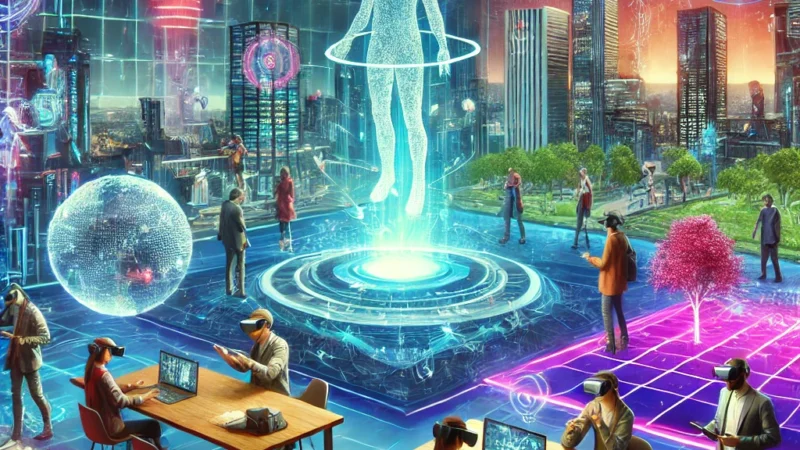Quantum Computing

Picture Credit
What is Quantum Computing ?
Quantum computing is a cutting-edge technology that uses the principles of quantum mechanics to perform complex computations at speeds vastly superior to classical computers.
Fundamental Concepts
- Qubits: Quantum computers use quantum bits (qubits), which, unlike classical bits, can exist as both 0 and 1 simultaneously due to superposition.
- Superposition: This property allows quantum computers to perform multiple calculations at once, giving them an exponential processing advantage over classical computers.
- Entanglement: Qubits can be entangled, meaning the state of one qubit instantly affects another, even across vast distances. This enables quantum computers to share information more efficiently.
- Quantum Tunneling: A process where qubits can “tunnel” through potential barriers, allowing quantum computers to quickly explore a large number of solutions.
Potential Applications
- Cryptography: Quantum computing could break traditional cryptographic codes by solving complex mathematical problems (e.g., factoring large prime numbers) faster than classical computers, which has led to the development of Post-Quantum Cryptography (PQC).
- Drug Discovery and Material Science: Quantum computers can simulate molecular interactions at the atomic level, accelerating drug discovery and materials development by predicting how molecules interact without needing physical testing.
- Optimization: Quantum computers excel at solving optimization problems, which have applications in industries like logistics, supply chains, and financial modeling.
- Artificial Intelligence: Enhances machine learning by analyzing large datasets faster and more efficiently.
Challenges
- Quantum Decoherence: Quantum states are fragile and can easily be disrupted by environmental factors, leading to errors in calculations.
- Error Correction: Ensuring accuracy in quantum computations is difficult due to the fragile nature of qubits.
- Scaling: It’s currently a challenge to build large-scale quantum computers due to noise and interference in qubit systems.
Current Developments
- Post-Quantum Cryptography: New cryptographic methods are being developed to protect data from future quantum attacks.
- Quantum Networking: Research into Quantum Networking could allow quantum computers to communicate and work together, significantly improving scalability.
Future Aspects OF QUANTUM COMPUTING
1. Enhanced Computational Power
- Quantum computers are expected to solve complex problems much faster than classical computers, particularly in fields like cryptography, optimization, and drug discovery. As they continue to evolve, they could handle tasks currently deemed impractical, significantly speeding up research and development processes.
2. Advancements in Quantum Algorithms
- New quantum algorithms are being developed to maximize the efficiency of quantum computing. These algorithms could revolutionize areas such as artificial intelligence, allowing for faster data processing and improved machine learning models.
The future of quantum computing is filled with potential and possibilities across various domains. Here are some anticipated aspects and developments:
1. Enhanced Computational Power
- Quantum computers are expected to solve complex problems much faster than classical computers, particularly in fields like cryptography, optimization, and drug discovery. As they continue to evolve, they could handle tasks currently deemed impractical, significantly speeding up research and development processes.
2. Advancements in Quantum Algorithms
- New quantum algorithms are being developed to maximize the efficiency of quantum computing. These algorithms could revolutionize areas such as artificial intelligence, allowing for faster data processing and improved machine learning models.
3. Quantum Internet
- With quantum computers posing threats to current cryptographic methods, the development of post-quantum cryptography is crucial. This aims to create secure communication protocols that can withstand quantum attacks, ensuring data security in the future.
5. Commercialization and Accessibility
- As research progresses, there is a push toward making quantum computing accessible to businesses and researchers. This could lead to widespread adoption across industries, driving innovation in sectors like finance, healthcare, and logistics.
6. Integration with Classical Systems
- Future quantum systems may work alongside classical computers, allowing businesses to utilize quantum computing for specific tasks while maintaining their existing infrastructure. This hybrid approach could optimize performance and resource allocation.
Quantum Computing is poised to revolutionize technology and industries by harnessing the principles of quantum mechanics to perform calculations at unprecedented speeds. With capabilities such as superposition and entanglement, quantum computers can tackle complex problems in fields like cryptography, drug discovery, and optimization far beyond the reach of classical systems. As research progresses, the development of post-quantum cryptography and a quantum internet will enhance data security and communication. While challenges like quantum decoherence and scalability remain, the ongoing evolution of quantum technology promises to reshape our understanding of computation and its applications, opening new frontiers in innovation.

neelam tyagi
Technical content writer with a master’s degree in Technology and a keen interest in Tech and Information Technology. She has over three years of experience in writing content for various online platforms, such as Boomi Techie, and Tech Mantra. She creates content that educates and empowers readers on topics such as AI, Tech News, and Innovations. She uses clear and concise language to explain complex tech concepts and terminologies.





